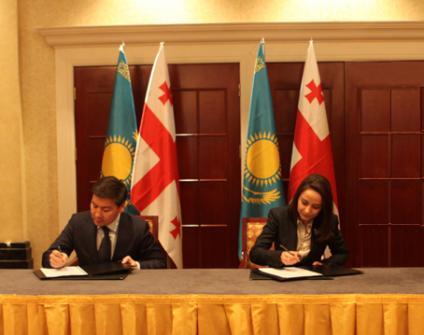
Silk Wind Project in Central Asia and South Caucasus Gains Speed
Publication: Eurasia Daily Monitor Volume: 9 Issue: 224
By:

In recent months, Kazakhstan and Georgia have joined with Azerbaijan and Turkey to make considerable progress in their Silk Wind Project, which aims to construct a high-speed, multimodal container transportation system for freight shipments between the countries of Europe, the Caucasus and Asia. According to the Ministry of Transport and Communications of Kazakhstan, the participating countries plan to introduce a single tariff for the transportation of goods within the project as well as share more preliminary information between their customs authorities and rail operators (Trend, November 28).
Deputy Prime Minister Erbol Orinbaev and a Kazakhstani government delegation discussed the project when they visited Georgia on November 17, 2012. They met with Finance Minister Nodar Khaduri and Energy Minister Kakha Kaladze to also discuss energy, transportation and other economic issues (Trend, November 17). Ways of simplifying customs procedures among the project participants were discussed the previous month during the first meeting of the heads of customs services of Turkic states in Azerbaijan (Georgia Times, November 23).
The Silk Wind project was initiated in the Transport Corridor Europe-Caucasus-Asia (TRACECA) framework, an EU-sponsored project that for two decades has sought to promote the economic and political development of the Black Sea, Caucasus and Central Asia regions by improving the transportation corridor between Europe and Asia through these countries. The main initial task for the Silk Wind project is to complete construction and modernization of the Baku-Tbilisi-Kars railway line, which is scheduled to open in 2014 (Georgia Times, November 23).
The Silk Wind Project fits well with the “New Silk Road” concept proposed by Washington, which Kazakhstan has particularly championed. Projects connected to the New Silk Road aim to increase the volume of trade between China and Europe flowing directly through the Central Asian and Caspian countries (see “Central Asia, Afghanistan and the New Silk Road Conference Report,” The Jamestown Foundation, September 14, 2011). In an effort to supplement its export routes through Russian territory, Kazakhstan plans to convey grain products and oil from its Kashagan field by train through Azerbaijan and Georgia onward to European markets. President Nursultan Nazarbayev has called on Kazakhstan’s partners to work on the “principle of the five Cs” (from Russian): speed, service, cost, safety and stability. Moreover, KazTransOil has acquired controlling shares of Georgia’s Batumi Sea Port and Batumi oil terminal in support of this project (Georgia Online, November 8).
Meanwhile, Georgia wants import energy from Kazakhstan as well as serve as a transit country for Kazakhstan’s trade with Europe. Until relations between Georgia and Russia substantially improve, Georgia will rely heavily on its commercial ties with Kazakhstan. In April 2012, then Georgian Minister of Economy and Sustainable Development Vera Kobalia said that cooperating with Kazakhstan in the transportation of goods from Asia to Europe “will involve our railroad and ports, which will help us solve the problems of employment, as well as to become a guarantor of safe transportation” (Turkish Weekly, April 11).
Despite close political ties with Moscow, Astana has never recognized the Russian-sponsored self-declared governments of Abkhazia and South Ossetia. Kazakhstani officials have always opposed separatism, especially within the Shanghai Cooperation Organization (SCO), but also in the case of Georgia. Kazakhstani officials have also resisted Russian pressure to ban imports of Georgian wine, which many Kazakhstanis favor over harder Russian alcoholic drinks such as vodka and whose import and sale generates substantial tax revenue for Kazakhstan’s government (see EDM, May 16, 2011).
Although Kazakhstani-Georgian economic relations suffered heavily in 2008, they have since recovered. In the first nine months of 2011, trade between Kazakhstan and Georgia reached $68.5 million, which represented a 26.1-percent increase over the corresponding period in 2010. Kazakhstan’s major exports to Georgia consist of coal, tin, metals, polypropylene, batteries and ties for vehicles, and sanitary equipment. Kazakhstan buys raw materials for metallurgy, engineering products, and its chemical and food industries from Georgia (Kazakhstani Prime Minister’s office, December 7, 2011).
Investors from Kazakhstan have established a major presence in Georgia’s harbor sphere, energy distribution and the tourism business. For example, Kazakhstani firms are helping build upscale hotels in Tbilisi, including a 170-room Radisson Hotel. Kazakhstan’s second largest bank, Bank Turan Alem, is financing the project, which also involves renovating the city square around the hotel. Turan Alem has also bought a controlling share in United Telecom of Georgia, the country’s largest telephone company, as well as some Georgian energy companies. Other examples of leading Kazakhstani companies now operating in Georgia include Rompetrol (wholly owned by the Kazakhstani government) KazTransGas-Tbilisi, KMG-service (which is completing construction of the sanatorium in Likani), KazTransOil, Air Astana and the Scat air company (Kazakhstani Prime Minister’s office, December 7, 2011).
The governments of Kazakhstan and Georgia have in spring 2012 committed to meet more regularly for bilateral discussions on trade and economic relations, especially under the auspices of the Intergovernmental Committee for Trade and Economic Cooperation between Georgia and Kazakhstan, which has until now met only once a year or so. Furthermore, although Kazakhstan and Georgia have traditionally collaborated most in the energy and transportation sectors, the fifth session of the Georgian-Kazakhstani intergovernmental commission agreed in April 2012 to expand cooperation to include trade, telecommunications, environmental protection, agriculture, tourism, cultural relations and other sectors (Turkish Weekly, April 11).
Yet, present political as well as economic conditions leave the future of the Kazakhstani-Georgia relationship uncertain. On October 2, 2012, Georgian citizens voted in parliamentary elections and peacefully transferred power from Saakashvili’s incumbent United National Movement to the opposition Georgian Dream Coalition, led by Bidzina Ivanishvili, who once held Russian citizenship. Ivanishvili has stated his intentions to improve Georgia’s relations with Russia, which likely would positively influence Georgian-Kazakhstani relations as well by making Astana’s “balancing act” much easier. However, a Georgian-Russian rapprochement may also reduce the importance to Tbilisi of building ties with Astana and Central Asia. The nature of the new relationship should become clearer by next February when Nazarbayev plans to visit Georgia (Trend, November 30).




